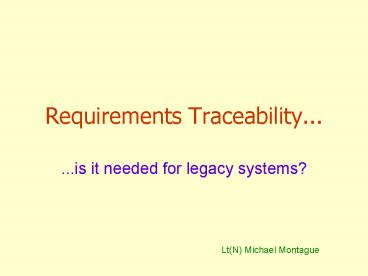Requirements Traceability''' - PowerPoint PPT Presentation
1 / 25
Title:
Requirements Traceability'''
Description:
(Sn) Pre-RS traceability. Post-RS traceability. Traceability Aids Project Managers in: ... Weaknesses: Limited remaining lifetime. Lack of original SOR ... – PowerPoint PPT presentation
Number of Views:86
Avg rating:3.0/5.0
Title: Requirements Traceability'''
1
Requirements Traceability...
- ...is it needed for legacy systems?
Lt(N) Michael Montague
2
Outline
- What is Requirements Traceability (RT)
- How traceability can aid Project Managers
- RT Issues
- Making RT work for you
- Applying RT to a legacy system
3
Lack of Common Definition
- Purpose-driven
- what it should do
- Solution-driven
- how it should do it
- Information-driven
- emphasising traceable information
- Direction-driven
- emphasising traceability direction
4
What is Requirements Traceability?
- Refers to the ability to describe and follow the
life of a requirement, in both a forwards and
backwards direction - Initially mandated by procurement agencies for
purposes of compliance verification
5
Requirements Traceability
Pre-RS traceability
Post-RS traceability
Requirements Specification
(S0)
(S1)
(Sn)
6
Traceability Aids Project Managers in
- Verification
- only required functions are designed into the
product - Cost Reduction
- allocate product requirements early in the
development cycle
7
Traceability Aids Project Managers in
- Accountability
- data is available for auditors
- Change Management
- determine what related elements of the design are
affected
8
RT Issues
- Two major problems remain w.r.t. continuous
change management - 1. Traceability does not go sufficiently
backwards to the source of requirements - 2. Traceability must be produced as a side
product of normal requirements engineering work
rather than creating extra effort
9
1. Traceability to the Source
- Unknown reality from which the requirements
emerged - design rationale information
- capture the why or reason for design decisions
10
2. Creating Extra Effort
- RT Tasks are time consuming and error-prone
- Users abilities to analyze traceability data are
limited by the sheer volume of the data
11
Making RT Work For You
- Dont forget Pre-RS traceability!
- Obtain, organize and maintain information
- Increase awareness of information
- Produced as a by-product of main activities
- Use automated tools
12
When is RT fit for use?
- Necessary when any one of these conditions hold
true - The customer requires it
- The project is complex
- You must see different types of documentation and
their interrelationships - You must ensure that you build and tested the
system you claimed - The system is safety critical
13
RT and Legacy Systems
- Systems are being used in an ever-changing real
world domain - require continued adaptation to changing needs
and conditions - ensure maintenance of user satisfaction
- to replace
14
RT and Legacy Systems
- Change, consequent upon system evolution, will
commonly require a better understanding of the
requirements - Can only be achieved by going back to the source
Pre-RS Traceability
Post-RS Traceability
Requirements Specification
(S0)
(S1)
(Sn)
15
Is RT Needed for Legacy Systems?
- Yes...
- Helps manage changing requirements over the
lifetime of a system - but not all systems will benefit from RT
- Satisfy instances where RT will help rather than
hinder - Can be expensive to implement if the desired
initial conditions are not in place
16
Applying RT to TRUMP CCS
- TRUMP CCS is a legacy system
- Developed during the 80s and implemented in the
90s - AN/UYK-507
- CMS-2
- SDX
17
Why Apply RT?
- Are the previous reasons for applying RT met?
- Does the customer require it?
- Yes
18
Why Apply RT?
- Is the project is complex?
- Yes
CCS
19
Why Apply RT?
- Must you see different types of documentation and
their interrelationships? - Yes
MMI
SRS
UM
20
Why Apply RT?
- Must you ensure that you build and tested the
system you claimed? - Yes
21
Why Apply RT?
- Is the system safety critical?
- Yes
22
Is RT Helping TRUMP CCS?
- Advantages
- Successfully track changes
- Small cost 5 of effort
- Limited remaining lifetime
- Weaknesses
- Limited remaining lifetime
- Lack of original SOR
- Concentrate effort on testing requirements
23
Questions?
(A Robs eye view)
24
References 1
1 Gotel, O. Finkelstein, A. (1994). An
Analysis of the Requirements Traceability
Problem. http//citeseer.nj.nec.com/gotel94analysi
s.html 2 Balasubramaniam, R Edwards, M.
(1993). Issues in the Development of a
Requirements Traceability Model. Proceedings of
the IEEE International Symposium on Requirements
Engineering, San Diego, California. pp
256-259. 3 Neal, M Watkins, R. (1994). Why
and How of Requirements Tracing. IEEE Software,
July 1994. pp 104-106. 4 Haumer, P Heymans,
P. et al. (1999). Bridging the Gap Between Past
and Future in RE A Scenario-Based Approach.
Proceedings of the IEEE Symposium on Requirements
Engineering, Limerick, Ireland. pp 66-73.
25
References 2
- 5 Finkelstein, A. (1991) Tracing Back From
Requirements. IEE Colloquium on Tools
Techniques for Maintaining Traceability During
Design (IEE, London), Digest No 1991/180. - 6 Kahen, G Lehman, M. et al. (1999) Can the
Legacy Syndrome be Avoided?-Legacy Systems in the
Context of Software Evolution. http//www-dse.doc.
ic.ac.uk/Papers/ - 7 Davis, A. Leffingwell, D. (1999) Making
Requirements Management Work for You.
http//stsc.hill.af.mil/crosstalk/1999/apr/davis.a
sp - 8 Brooks, F. (1995) The Mythical Man-Month
Essays on Software Engineering, Anniversary
Edition. Addison Wesley Longman Inc, Berkeley.































